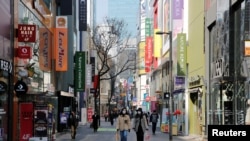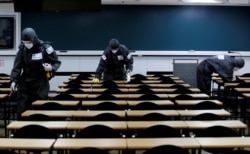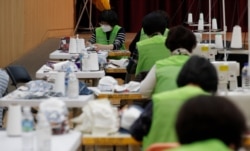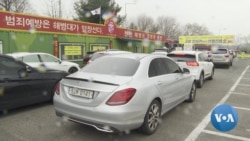It was Thursday morning, and my phone buzzed with a text message from South Korea’s emergency alert system, as it has hundreds of times during the coronavirus outbreak.
Someone in my Seoul neighborhood — a 35-year-old Polish male — had tested positive. Clicking a link to a government website revealed an astonishing level of detail about the man’s activities over the previous two days.
After arriving at Seoul’s Incheon airport at about 9:00 a.m., the man took an express train to my local metro station, where, wearing a mask, he shopped at a nearby E-Mart grocery store. He then returned home, before getting dinner five hours later at an Italian restaurant in Seoul’s Itaewon neighborhood popular with foreigners. He was still wearing a mask, but took it off while eating, the message adds.
The next day, the man visited the ground floor of my local bank, ate dumplings at a restaurant down the street, visited a nearby animal hotel, and eventually wound up at my local hospital, where he became one of approximately 9,000 people in South Korea to test positive for the coronavirus.
By now, such messages are commonplace in South Korea, as is the ominous chorus of accompanying tones that can be heard at bus stops, offices, and other community settings. Some days, I receive over a dozen alerts about infections in my area. When I travel to other parts of Seoul, my phone vibrates with new reports about cases in those neighborhoods.
To compile those messages, South Korea relies not only on in-person interviews, but also instant access to extensive amounts of personal information — such as bank records, phone GPS data, and surveillance footage — not only for confirmed coronavirus patients but also suspected cases.
This access is possible because South Korean lawmakers loosened privacy laws following a 2015 outbreak of MERS, which resulted in 39 deaths here. Now, during dangerous epidemics, authorities have warrantless access to such private data.
The plan has worked
As a result, South Korea has been able to locate coronavirus clusters, investigate the path of infection, quickly isolate those involved, and warn the public about trouble spots to avoid.
The result has been stunning: South Korea has reported one of the lowest coronavirus death rates in the world: as of Monday, only 111 people have died out of 8,961 cases.
The rate of new infections has also plunged. After reaching a daily peak of 909 new cases on February 29, South Korea reported just 64 on Monday.
South Korea’s approach has been widely praised as a global model of how to contain the coronavirus without resorting to forced restrictions on movement or widespread business closures.
But there are concerns about the long-term impact of countries loosening privacy laws to deal with disease outbreaks.
Kenneth Roth, executive director of Human Rights Watch, told me his organization is “deeply concerned” governments will take advantage of the coronavirus threat to enhance their powers of electronic surveillance.
“Once we allow them to be regularly used and give up this essential aspect of our right of privacy, it will be very difficult to put the genie back in the bottle when the threat of the coronavirus fades,” says Roth.
The organization has also urged countries to “avoid sweeping and overly broad restrictions on movement and personal liberty” and to impose mandatory restrictions “only when scientifically warranted and necessary.”
Trade-off accepted?
If South Korea is offering a temporary reduction in privacy in exchange for protection against a highly contagious disease, then it's a trade-off many South Koreans seem happy with.
Amid the coronavirus crisis, South Korean President Moon Jae-in is enjoying his highest approval ratings in months.
Ki Moran, who heads the Korean Society of Preventive Medicine’s committee for emergency response, says the MERS crisis demonstrated a dire need to find the “missing parts” in epidemiological investigations. Loosening South Korea’s privacy laws was the correct way to do that, she says.
“It’s the main reason why epidemiological investigations can be so detailed now,” says Ki.
In some ways, South Korea’s government is further aided by institutional remnants of its authoritarian past, says Lee Sang-sin, who focuses on political science and public opinion at the Korean Institute for National Unification.
One of those remnants is South Korea’s national registration system, he says. Under the system, phone companies must require all customers to provide their real names and ID numbers. That has made it easier for authorities to track down suspected coronavirus patients.
“If used by democratic, capable and responsible governments, these authoritarian apparatuses can be extremely useful and effective. But it also means that it is very easy for us to go back to an authoritarian regime,” he says.
May not work as model
There are other reasons it may be difficult for countries to emulate South Korea’s coronavirus response.
With just 51 million people, South Korea is a relatively small country. And over half the population lives in the Seoul metropolitan area, making policy coordination easier.
Perhaps the biggest factor: everyone in South Korea — even almost all foreigners, including me — is part of an affordable and efficient national healthcare system.
Under a single system, South Korea has seen fewer delays in expanding its coronavirus testing, including at its approximately 50 drive-thru testing centers, which received global praise for their innovation and safety.
Back to normal?
As the number of new coronavirus infections falls, life in Seoul has in some ways begun to return to normal - or at least a modified version of it.
Schools and most other group gatherings remain canceled and many continue to work from home. But this past weekend, which saw the warmest weather of the year so far, more couples and families ventured out to parks along the Han River, even as most observed the government’s social distancing recommendations by staying two meters apart.
In Seoul, the city government has been pushing a slogan called “Let’s Take a Break from Social Life,” a fairly depressing promotional campaign for a major world city. But as my wife and I enjoyed kimchi stew this weekend at a local restaurant that was only half empty, we wondered if the break could almost be over.









